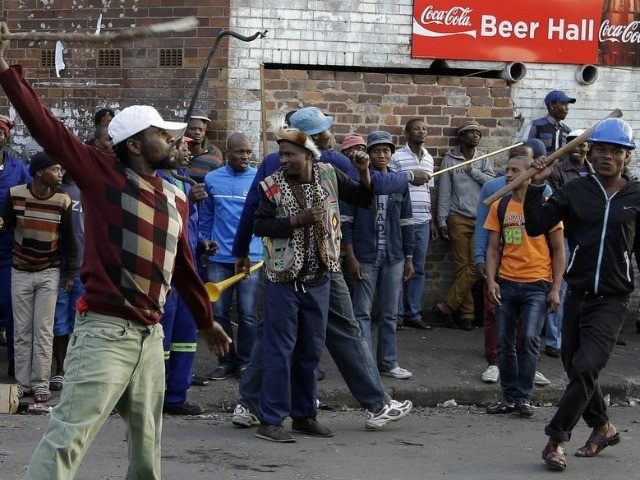The Nigerian Senate is contemplating bringing Zulu King Goodwill Zwelithini to the International Criminal Court (ICC) for remarks in which he called immigrants to South Africa “ants” and “head lice,” remarks believed to have triggered a growing wave of xenophobic violence in that country.
According to Nigeria’s Vanguard newspaper, Nigeria’s Senate met this week to discuss the possibility of the federal government bringing Zwelithini to the ICC for violation of international hate speech laws and inciting violence. Following a speech in which Zwelithini compared immigrants to “head lice,” South Africans, mostly young men, took to the streets to defile foreign-owned businesses and assault foreigners, many of whom are Nigerians.
The Senate drafted a resolution to urge President Goodluck Jonathan to precipitate legal action. “The African Parliament must take this up seriously; we cannot have a situation where one king gets up and begins to say that people should go away. That is preaching hatred and is unacceptable,” said Senate President David Mark.
At least one major civil society organization is supporting the measure. The Socio-Economic Rights and Accountability Project, a Nigerian NGO, issued an official statement calling on the ICC to directly “investigate allegations of hate speech by the Zulu King Goodwill Zwelithini, which has resulted in killing, violence and discrimination against Nigerians and other African citizens.”
In addition to the use of international law, the Ministry of Foreign Affairs informed the press that it had summoned South African High Commissioner to Nigeria Lulu Mnguni to lodge a formal complaint. “During the meeting with the envoy, Ambassador Obanikoro condemned the attacks on foreigners in South Africa, expressing concern on the fate of Nigerians and other nationals, who are migrants in the country,” according to the Ministry.
Vanguard notes that the Nigerian Senate draft estimates that “no fewer than 50 have been reportedly rendered homeless after being displaced by these attacks and about 300 others displaced near Johannesburg. … By the last count, property and Nigerian businesses worth millions of naira have been destroyed.”
Zwelithini, who is a close ally of ethnic Zulu President Jacob Zuma, stated in a speech earlier this month that the South African government “must deal with our own lice. In our heads, let’s take out the ants and leave them in the sun. We are asking that immigrants must take their bags and go where they come from.” The remarks have been compared to rhetoric broadcast in Kigali during the Rwandan genocide, in which ethnic Tutsis were frequently compared to “cockroaches.”
The Zulu king has not apologized for his remarks, instead calling the violence against foreigners “vile” and requesting the South African government stop the attacks. “The country has only been shown a portion of my speech, which has been selective,” he added in his defense. “If it were true that I said ‘foreigners must go’ this country would be up in flames.”
South African taxpayers invest millions in keeping Zwelithini well cared for. The Daily Mail reports that Zwelithini receives at least $3 million a year from the government, which he uses to maintain his six wives and 28 children.
The BBC estimates that 5,000 people have been left homeless by the destruction of foreign-owned buildings and looting of shops, and seven people have died since Zwelithini’s speech. The clubbing death of Mozambique national Emmanuel Sithole was caught by The Times’ camera. An estimated five million immigrants live in South Africa.
Many who have yet to be hit by the outbreak of violence have expressed concern that they will be next, and that inaction on the part of the federal government, due to Zuma’s ties to the Zulu king, will only encourage more violence. “There has to be consequences. … I haven’t seen anyone who has been punished for their role in looting,” said one business owner, Nigerian Damian Ohajunwa. “That’s stealing! It’s not acceptable!”
The South African government claims, however, that at least 300 people have been arrested for looting and assault related to anti-immigrant sentiments.
The violence has triggered counter-attacks across Africa. In Malawi, citizens shut down South African-owned shops in protest at the behest of local consumer organizations, which hope to show the South African government their need for friendly relations with foreigners. Malawi, Nigeria, Mozambique, and Zimbabwe have begun programs to evacuate their citizens.
South Africans not partaking in the violence have responded by holding large peaceful rallies to call for an end to the attacks. This week, 30,000 people took to the streets of Johannesburg with signs reading, “Welcome foreigners,” calling for peace between native South Africans and immigrants. The New York Times notes that Zulu regions in particular have organized pro-immigrant rallies, defying the king.

COMMENTS
Please let us know if you're having issues with commenting.